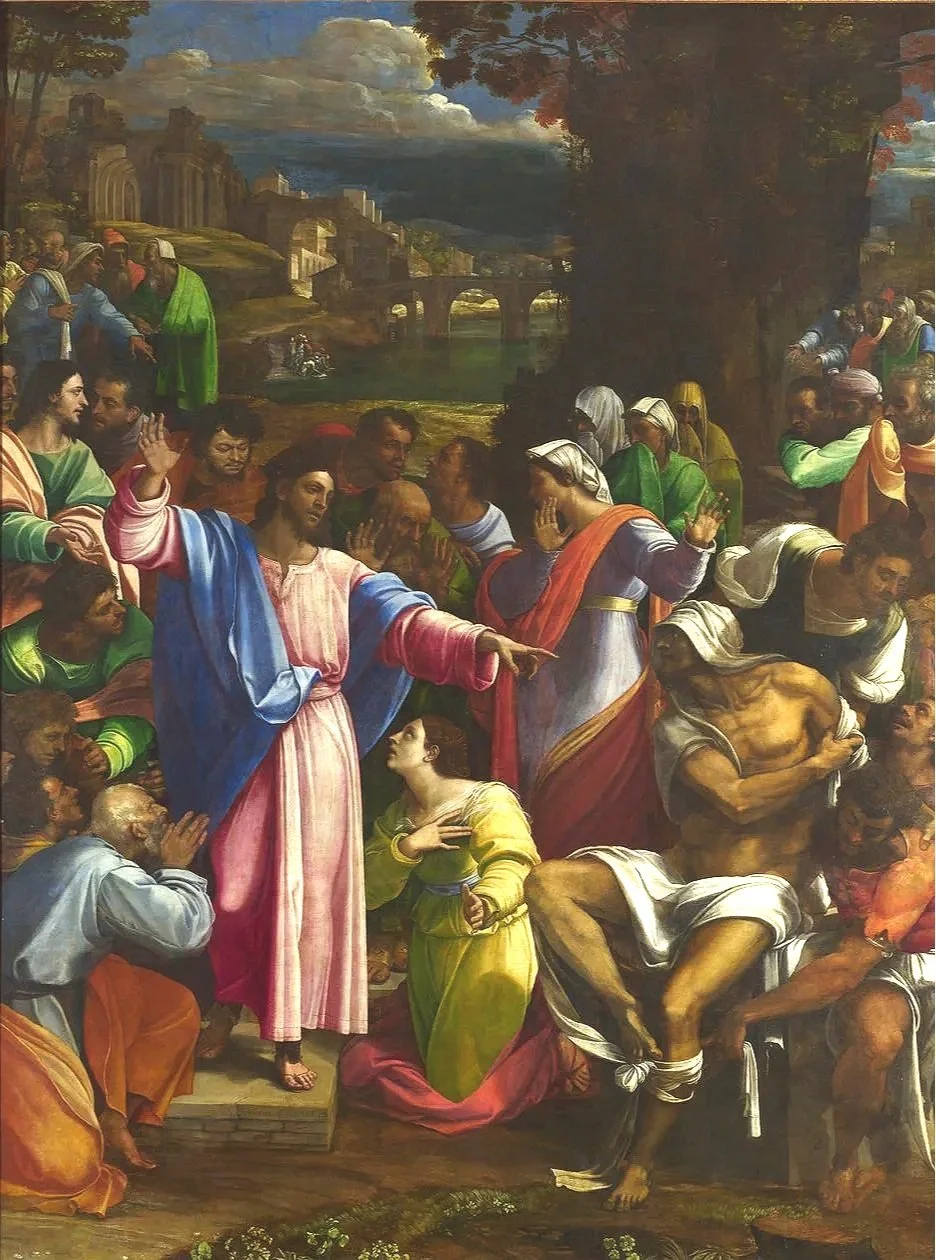If walking with Jesus is the difference between your life being a living branch and a dead branch, then getting this right—and we have the Spirit’s help—is critical. Below is an outline summary of the sermon for your further study and deeper reflection.
SERIES: The I Am Sayings of Jesus
TEXT: John 15:5
TITLE: The Vine Life
PREACHER: Derek Overstreet
POINTS:
I. The Command to Abide
II. The Promise of Fruitfulness
SERMON EXCERPTS:
All quotes and text emphasis are taken directly from the pastor’s notes.
ILLUSTRATION: ’80s anti-drug TV campaign, simple and clear message
“Jesus is the difference between your life being (a living vine, producing fruit, and a crispy, dead vine). Let’s close in prayer. The vine and the branches—a simple and clear message.”
“Yet, it seems we spend our entire lives learning how to live in what Jesus describes here. There are two reasons for this. First, the message of John 15 is simple yet profoundly deep. Two, we tend to approach John 15 with either a legalistic attitude or a prideful presumption upon God’s grace, both representing an arrogant and ignorant understanding of the gospel.”
“But if walking with Jesus is the difference between your life being (vines), then getting this right—and we have the Spirit’s help—is critical.”
“The keyword in our text is abide. Eleven times, Jesus uses it. It means to reside or remain. The thrust of the word is to stay put, not go anywhere. In the context of John 15, it simply means to walk with Jesus. Here, it is a command—Abide in me.”
“To help us, Jesus uses the imagery of a vine and its branches, with the vine, of course, being Jesus, and we are the branches. Jesus begins by saying in 1—I am the true vine. This metaphor would have been familiar to the disciples. In the OT, Israel is often likened to a vine in passages like Psalm 80, Jeremiah 2, and Ezekiel 15. Typically, the metaphor is used to show that Israel had become a wild vine, imagery that communicates their rebellion and sinfulness in turning away from God to the world around them.”
“Just as Jesus supersedes the temple, the sacrifices, the feasts, and Moses, he is the true vine, the only connection to and life of God in His people.”
“We have seen this repeatedly over the past few weeks: Whether Jesus claims to be the bread of life, the light of the world, the door, the good Shepherd, the resurrection, the life or the way, at the center of each claim has been this—Jesus is the source, the only true source, of life and vitality and joy in the Christian life. The vine and branches imagery makes that clear.”
“Jesus says, the branch has no life unless it is connected to the vine. He goes on in 6 Jesus to say—A branch that is not connected to the vine withers and dies. But when the branch is connected to the vine, it has life and bears fruit because it receives life and nourishment from the sap it draws from the vine. The branch is entirely dependent upon the vine.”
“We know this life-giving connection to Jesus as our union with Christ. By faith in the life, death, and resurrection of Jesus, the Spirit unites us; he connects us to Christ, who becomes not only our identity but the source of our very life.”
“This is at the heart of the Christian life and experience. Christ’s life is our life. He dwells in us and we dwell in him. His sufferings are our sufferings. His death is our death. His resurrection is our resurrection. His strength is our strength. His seat in the heavenly places is our seat in the heavenly places. His heavenly Father is our heavenly Father.”
“Now, for the unbeliever or fake believer who looks the part (some commentators believe Jesus has Judas in mind), Jesus' teaching is a call to repentance and faith in himself as the true life-giving vine. Unless you are connected to Jesus, you can't bear fruit that has any eternal value. Instead, you will, as it says in 2, be removed, and according to 6, thrown into the fire. In other words, hell is your destiny unless, by the mercies of God, you turn to Jesus in repentance and faith—something you can do right now.”
“For the believer, the imagery acts as an encouragement, for some a warning, to cling to Christ, so that your life will bring glory to God by bearing the fruit God desires. To be sure, there is no such thing as a fruitless Christian. Jesus’ teaching in Luke 8 about how a good tree bears good fruit settles that. But a true Christian can live contrary to the union they have with Christ. When we choose NOT to live in the goodness of the gospel or in a way that is NOT in keeping with the gospel, in a sense, we separate ourselves from the vine. In doing so, our lives are not as fruitful as they could be or as God desires.”
“Of course, the BIG question is—How do we know if we are abiding in Christ? The text tells us. We abide in Christ by depending on him - read verse 5.”
“We are saved by grace through faith. Faith is simply trusting in Jesus. It is recognizing that you are utterly dependent upon him for salvation. That never changes in the Christian life. Day by day, we walk with Jesus trusting him for all we are and need before God—day by day, we choose to believe his promises and rely on his presence to endure in holiness.”
“What do we call that? We call that depending on Jesus. And we rely on him because we can do nothing apart from him. That’s part of abiding in Jesus.”
“We abide in Christ by embracing God’s loving discipline—read verses 1-2. Here, we are introduced to the vinedresser. That is God Himself. Not only does the vinedresser remove the branches that do not belong to Him, but He prunes those that do. His pruning is His discipline.”
“One of the ways you promote the health and growth of a plant is by pruning the excess branches so they can produce even more. Spiritually, we refer to it as becoming more like Christ. This is what is happening in sanctification. Through the trials and circumstances of our lives, God, the vinedresser, is pruning us so that we will bear more fruit. In this way, God does truly work all things for our good (Romans 8:28).”
“We abide in Christ by obeying his word—read verses 7-10. Abide in me…my words abide in you…Abide in my love, they all communicate the same BIG idea. To abide in Christ is to walk in obedience to his word. It is to allow all Christ taught about himself, his Father, the Spirit, and their eternal purposes to fill our hearts, guide our steps, shape our actions, inform our thoughts, and direct our lives.”
“Abiding isn’t a touch-and-go relationship. It isn’t checking in with Jesus periodically. Abiding isn’t just a Sunday morning thing. It’s about daily fellowship with Christ, feasting on his word, obeying his word, and trusting his promises because we love him and long to experience his life at work in us for our fruitfulness and most of all God’s glory! This is life in the Vine, The Vine Life, and it is good!”
“Critical: At the heart of all three of these is the gospel—read 9. Jesus says, 'I love you with a Trinitarian love; now abide in my love.' 1 John 4:10 says the nature and depths of that love are most clearly seen at Calvary, where God gave His only Son, Jesus, for our sins.”
“We abide in Christ by clinging to his cross. In one sense, the relationship between a vine and the branch is natural. But in the Christian life, it must be cultivated. Jesus calls, indeed commands, us to something here. Abiding is not automatic. But our abiding must always take place in the shadow of the cross, where we find our motivation, our strength, and our hope.”
“Jesus attaches a promise to abiding—fruitfulness. Jesus wants us to bear fruit. Seven times he uses the word fruit. In 8, he says a spiritually fruitful life glorifies his Father. There is no higher goal than that.”
“In 16, Jesus says—You did not choose me, but I chose you and appointed that you should—Have a hassle-free life? Experience the American dream? Live free from health issues? No, he says, that you should go and bear fruit. And Jesus promises a cornucopia of fruit:
7—Answered prayer
8—God’s glory in our lives
11—Fullness of joy
12&17—Love for one another
27—Gospel witness”
“We have to keep spiritual fruit in our lives in perspective. Fruit is ultimately evidence of Christ abiding in us, not our abiding in him. The life and power that creates fruit is in the vine, not the branch.”
“I would like to conclude with a story that puts all this into perspective. During a season of spiritual struggle, the great missionary Hudson Taylor wrote a letter to his sister:
The last month or more has been perhaps the happiest of my life, and I long to tell you a little of what the Lord has done for my soul. My mind has been greatly exercised for six or eight months past, feeling the need personally for our mission of more holiness, life, power in our souls. I felt the ingratitude, the danger, the sin of not living nearer to God. I prayed, agonized, fasted, strove, made resolutions, read the word more diligently, sought more time for meditation; but all without avail. Every day, almost every hour, the consciousness of sin oppressed me. I knew that if I could only abide in Christ all would be well, but I could not. I would begin the day with prayer, determined not to take my eye off him for a moment, but pressure of duties, sometimes very trying, and constant interruptions, apt to be so wearying, caused me to forget him. Instead of growing stronger, I seemed to be getting weaker and to have less power against sin; and no wonder, for faith and even hope were getting low. I hated myself, I hated my sin, yet gained no strength against it. I felt I was a child of God—the spirit in my heart would cry, in spite of all, ‘Abba, Father!’—but to rise to my privileges as a child I was utterly powerless. All the time I felt assured there was in Christ all I needed, but the practical question was how to get it out. He was rich, truly, but I was poor; he was strong, but I was weak. I knew full well that there was in the root, the stem, abundant fatness, but how to get it into my puny little branch was the question. As gradually light dawned, I saw that faith was the only requisite, was the land to lay hold on his fullness and make it mine, but I had not this faith. Then Mr. Taylor mentioned something a friend recently wrote him: How do you get your faith strengthened? Not by striving after faith, but by resting on the Faithful One. … As I read that letter, I saw it all. I looked to Jesus and saw, and when I saw, oh how joy flowed! That he had said, ‘I will never leave thee.’ Ah, there is rest! I thought. I have striven in vain to rest in him; I’ll strive no more, for has he not promised to abide with me, never to leave me, never to fail me? He never will. Nor was this all he showed me, not one half. As I thought of the vine and the branches, what light the blessed Spirit poured direct into my soul! How great seemed my mistake in wishing to get the sap, the fullness out of him. I saw not only that Jesus will never leave me, but that I am a member of his body, of his flesh and of his bones. The vine is not the root merely, but all root, stem, branches, twigs, leaves, flowers, fruit! And Jesus is not that alone; he is soil and sunshine, air and showers, and ten thousand times more than we have ever dreamed, wished for, or needed. Oh the joy of seeing this truth!”
ADDITIONAL SCRIPTURE:
Galatians 2:20
Hebrews 12:10-11
QUOTES:
Leon Morris - “Israel had failed to produce the fruit that would have been expected; they were false to their God, who had done so much for them….But where Israel failed and had become a false vine, we now see the true vine, the vine in which the purpose of God would be worked out.”
Charles Spurgeon - “Do not merely find a temporary shelter in me, as a ship runs into harbor in stormy weather, and then comes out again when the gale is over; but cast anchor in me, as the vessel does when it reaches its desired haven. Be not as branches that are tied on, and so can be taken off, but be livingly joined to me—Abide in me!...Dear friends, beware of a Christless Christianity. Beware of trying to be Christians without living daily upon Christ. The branch may just as well try to bear fruit apart from the vine as for you to hope to maintain the reality of Christian life without continual fellowship with the Lord Jesus Christ......There is the great canon of the Christian life. Hold fast to Christ. Not only live with him, but live in him—Abide in me! Let Jesus not be merely your companion now and then, on holy occasions, but let him abide in you; make your heart a temple; let him find his sweetest rest his home in you.”
D.A. Carson - “This fruit is not the inorganic growth of external accretion (not the effect of all our spiritual activity). It is organic growth, internal growth, driven by the pulsating life of the vine in the branch, and only this kind of growth produces fruit.”
APPLICATION:
I think for most of us, our impulse is to leave here more aware of what we need to do than who Christ is. But the ultimate point of our text and the entire I Am series: Christ is the fullness of true life.
In the strength of the Spirit and with the motivation of the gospel, we abide in Christ; depending on Jesus daily; feeding and nourishing our faith with the word and prayer, walking in joyful obedience to all God calls us to, knowing that those activities are not the fullness of life, but expressions of our faith that Jesus IS the beautiful and glorious fullness of life that is ours by faith.
SONGS FROM THIS SUNDAY:
Christ Our Hope In Life And Death
He Will Hold Me Fast
All Things
When We See Your Face
All I Have Is Christ
A Christian's Daily Prayer
NEXT WEEK’S PASSAGE:
Matthew 28:16-20 - A Church Planting Missiology
THE BOOK OF THE QUARTER:
To download a FREE PDF version of this journal (and other past issues), please visit: https://www.sovereigngrace.com/journal














